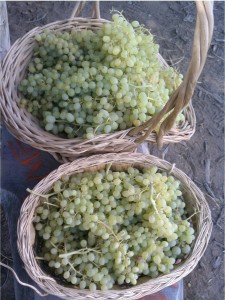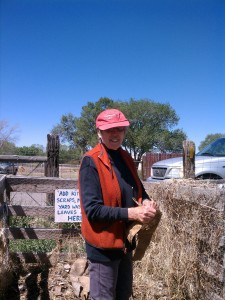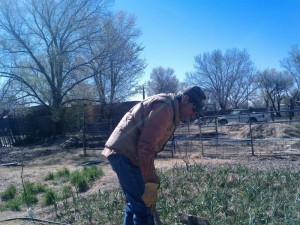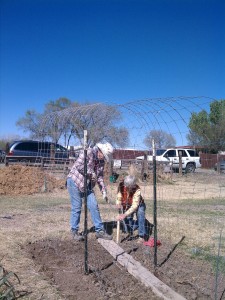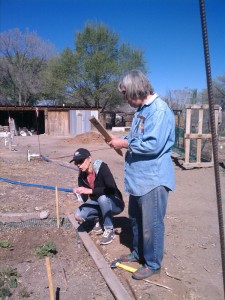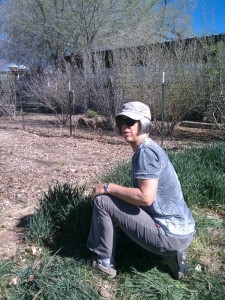August harvest and carrying on in spite of the heat
Early veggies available in Tomé at the Community Center
Farmer’s Market in Historic Tomé Thursdays 4-7 pm
at the Tome Dominguez Community Center
on the north side of Hwy 47 directly across from Valencia Community Gardens
Vendors welcome at a cost of $3.00 per table/spot
Contact Andrea for more information at 865-3394 July 21, 2016-September 15, 2016. Be sure to check out TTLG’s corn patch on the premises.
Molly Madden’s squash bug research
Life Cycle
Adults overwinter and seek shelter under dead leaves, vines, rocks and other garden debris. As temperatures begin to warm in the spring (late May and early June), squash bugs emerge and fly into gardens where they feed and mate. Egg laying soon begins and continues until midsummer with females depositing small brown eggs usually on the undersides of leaves. Eggs hatch in one to two weeks and the young nymphs disperse quickly to feed. Nymphs pass through 5 instars requiring up to 6 weeks to develop into adults. There is typically one generation per year.
Note: Because of the long egg laying period, all stages of this garden pest occur throughout the summer.
Squash Bug Control
• Plant resistant varieties when available.
• If only a few plants are affected, handpick all stages from the undersides of leaves.
• Place boards or shingles on the ground near host plants. Used as a nighttime shelter, they make excellent traps for morning collecting.
• Floating row covers are extremely effective when placed on seedlings and left in place until plants are old enough to tolerate damage.
• Diatomaceous earth, a natural pesticide made from the fossilized shells of one-celled organisms called diatoms, is abrasive to many insects and can be dusted over plants to reduce numbers.
• If pest levels become intolerable, spot treat with an organic insecticide.
• Roto-till or dispose of infested crop remnants shortly after harvest to reduce overwintering adults.
Molly concludes: Adults do manage to overwinter in our garden. Sounds like hand picking the eggs is a good strategy if we do it every garden day because the eggs need 1-2 weeks to hatch.
Genetically modified crops do not add to human health risks, study concludes, but study doesn’t find increased yields either.
http://www.stltoday.com/business/local/article_a7ffbe9a-5848-5826-aa28-6b75b3c947d2.html
You’ll find links in this article to the new GMO study by the National Academies of Sciences and claims of conflict of interest by Food and Water Watch. Read and see what you think. Note that the question of the effect of herbicides on GMOs is still open.
May 4, 2016
Tomato seedlings from seedygalbeth
Early spring at the garden
Organic and Grass-Fed: Get what you pay for
New Studies Prove Organic and Grass-Fed Are Worth the Price
Feb. 29, 2016
It always bothers me when I hear people say organic food is too expensive. To me it’s a question of whether you value your health and whether you’re willing to cook at home limiting meat and stocking up on organic bulk foods, not to mention growing your own veggies and raising your own eggs organically if not your own cows.
http://articles.mercola.com/sites/articles/archive/2016/02/29/organic-food-grass-fed-meat-milk.aspx
GMO study on tumors in rats
Thanks, Joyce, for posting this now vindicated study that was discredited by forged evidence.
http://globaljusticeecology.org/scientist-who-discovered-that-gmos-cause-tumors-wins-lawsuit/
See more here: http://www.gmoseralini.org/en/
What roots look like
 The Secret Life of Roots at the U.S. Botanic Garden in Washington this weekend.
The Secret Life of Roots at the U.S. Botanic Garden in Washington this weekend.
Thanks to Suzanne Taylor for posting this photo on Facebook. Roots can break up nearly impenetrable soil so water and nutrients can percolate. That’s one reason we plant cover crops in our community garden. Soil stores carbon. Cover crops reduce need for fertilizer if you’re a conventional farmer (which we aren’t). We use manure and mulch as well as cover crops. Then we can drill down to plant seed, leaving the cover to prevent evaporation.
Green Cover Seed
This place has almost 100 varieties of cover crop seed for sale, and they take PayPal.
USDA Forces Whole Foods to Accept Monsanto
Perhaps you recall that in 2013 Whole Foods announced they would label GMOs by 2018. Well, apparently intentions have changed. I don’t know if USDA is forcing or Whole Foods, Organic Valley, and Stonyfield Farm are choosing to accept Monsanto’s GMOs. You decide if in allowing GMO alfalfa, these groups are opening the door to other GMOs. Whole Foods’ email says, “The policy set for GE alfalfa will most likely guide policies for other GE crops as well True coexistence is a must.”
http://readersupportednews.org/opinion2/265-34/34968-usda-forces-whole-foods-to-accept-monsanto
and http://www.counterpunch.org/2011/01/28/the-organic-elite-surrenders-to-monsanto/
How Roundup Damages Your Mitochondria and Makes You Sick
Now we need to grow organic more than ever and support GMO labeling.
Zika Virus possibly from GMO mosquitoes
I hate the expression “perfect storm,” but here is one: The mosquito engineered to wipe out dengue fever, by being released where tetracycline is present in animal feed, breeds without the self-destruct function, thereby facilitating the spread of Zika virus. Or maybe the tetracycline–inserted into genes as a marker–is itself part of the genetic engineering process (though the article doesn’t say so).http://theantimedia.org/zika-outbreak-epicenter-in-same-area-where-gm-mosquitoes-were-released-in-2015/


